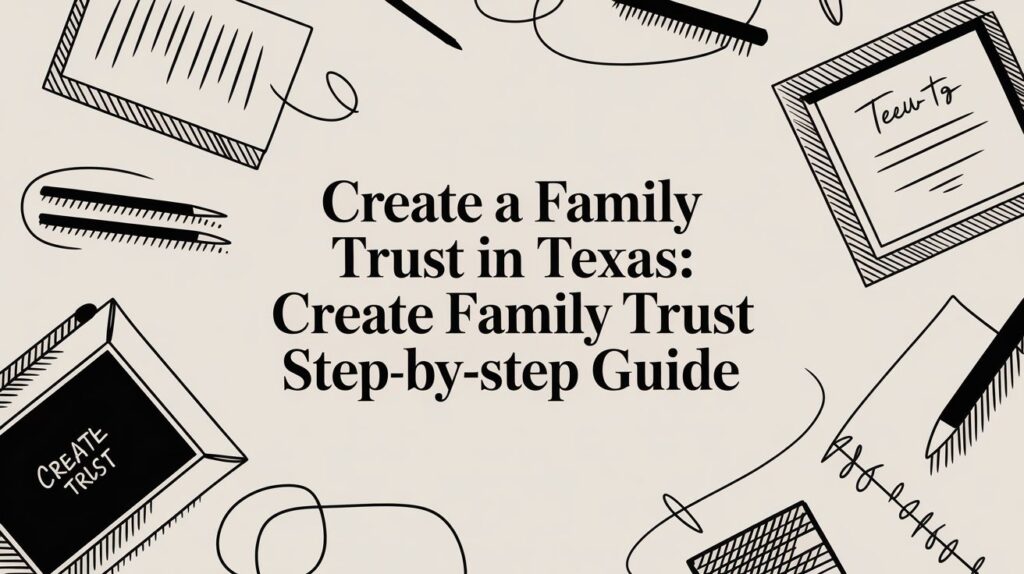Estate planning in Texas refers to arranging and organizing your assets and affairs to ensure their effective management and distribution upon your death or incapacitation. It involves making key decisions about transferring your property, financial assets, and personal belongings to your chosen beneficiaries and appointing trusted individuals to make decisions on your behalf if you cannot do so.
What is A Blended Family?
In Texas, a blended family refers to a family unit in which one or both spouses have children from a previous relationship or marriage and have come together to form a new family. The term “blended” reflects the merging of individuals from different families into a new household. Blended families can take various forms, such as:
- Stepfamilies: This occurs when one spouse brings children from a previous relationship into the marriage. The other spouse becomes a stepparent to those children.
- Half-siblings: In a blended family, half-siblings refer to children who share one biological parent but have different biological parents from the other side. For example, if a couple has a child together, and each spouse has a child from a previous relationship, the children are considered half-siblings.
Blended families in Texas face unique dynamics and challenges regarding estate planning, child custody, inheritance, and other legal matters. It’s crucial for individuals in blended families to carefully consider these factors and work with an experienced family law or estate planning attorney to address any potential complexities and ensure the protection of everyone’s rights and interests.

Understanding the Challenges
Estate planning for blended families involves navigating complex family dynamics, competing financial interests, and legal obligations. Failure to plan adequately can lead to unintended consequences, disputes, and potential financial hardships for your family. Understanding these challenges can help you develop a comprehensive estate plan that addresses the specific needs of your blended family. Here are some key challenges to be aware of:
Disinheriting unintentionally:
Without proper planning, you risk unintentionally disinheriting your children or stepchildren. Texas laws regarding intestate succession, which apply when there is no valid will, may not align with your desired distribution of assets. It is crucial to clearly outline your intentions in your estate plan to ensure your assets are distributed according to your wishes.
Balancing the needs of spouse and children:
Providing for your current spouse while ensuring your children from previous relationships are adequately cared for can be a delicate balancing act. Texas allows a surviving spouse to claim a portion of the estate as community property, potentially conflicting with your intentions to provide for your children. Proper estate planning strategies, such as using trusts, can help balance your spouse’s and children’s financial interests.
Stepchildren’s rights:
Stepchildren do not have automatic inheritance rights under Texas law. If you wish to include your stepchildren as beneficiaries, explicitly designate them in your estate plan. Failing to do so may result in them being excluded from any inheritance.
Complex family dynamics:
Blended families often involve intricate family dynamics and relationships. Disagreements, disputes, and potential conflicts can arise if there is ambiguity or lack of clarity in your estate plan. It is crucial to openly communicate your intentions with all family members involved and proactively address potential sources of conflict.
Medicaid planning and long-term care considerations:
If you or your spouse require long-term care in the future, it is important to consider Medicaid planning. Medicaid eligibility rules are complex, and improper planning can result in disqualification or the depletion of your assets. Working with an estate planning attorney knowledgeable about Medicaid rules in Texas can help you protect your assets while ensuring access to necessary care.
Blended family structure changes:

Blended families are dynamic, and relationships may evolve over time. Divorce, remarriage, or the birth of additional children can impact your estate plan. Reviewing and updating your estate plan periodically to reflect any changes in your family structure or your wishes regarding asset distribution is essential.
Navigating these challenges requires careful thought and proactive planning. Consulting with an experienced estate planning attorney in Texas who understands the complexities of blended family dynamics and state-specific laws, like us here at the Law Office of Bryan Fagan, can provide you with the guidance needed to develop an estate plan that protects the interests of your loved ones.
Key Strategies for Estate Planning in Blended Families
Open Communication:
Open and honest communication is the foundation of successful estate planning in blended families. Discussing your wishes and intentions with all family members involved, including your spouse, children from previous relationships, and any stepchildren is crucial. You can address concerns, manage expectations, and minimize potential conflicts by involving everyone in the planning process.
Update Your Beneficiary Designations:
Review and update beneficiary designations on your accounts, including life insurance policies, retirement, and bank accounts. Failure to update these designations can result in unintended consequences, such as assets passing to an ex-spouse instead of your current spouse or children.
Create a Will:

Drafting a comprehensive will is essential for blended families in Texas. A will allows you to specify how your assets should be distributed upon death. It is particularly important to clearly outline your intentions regarding assets meant for your spouse, children from previous relationships, and stepchildren. Without a will, the state’s intestacy laws will dictate how your assets are distributed, which may not align with your wishes.
Consider Trusts:
Trusts can be valuable estate planning tools for blended families. A trust allows you to hold and distribute assets for the benefit of your chosen beneficiaries while maintaining control over how and when those assets are distributed. For example, a trust can ensure that your current spouse is provided for during their lifetime while preserving assets for distribution to your biological children or stepchildren upon death. Various types of trusts, such as revocable living trusts or irrevocable trusts, may be appropriate depending on your specific goals and circumstances.
Plan for Long-Term Care:
Long-term care planning is crucial for blended families, especially when one or both spouses may require care in the future. Consider including Medicaid planning and long-term care insurance in your estate plan. Consulting with an experienced estate planning attorney in Texas can help you navigate the complex rules and regulations of long-term care planning.
Designate Guardianship for Minor Children:
If you have minor children, it is essential to designate a guardian for them in the event of your death/incapacity. In blended families, this decision can be particularly challenging. Consider the dynamics between the stepparent, biological parent, and extended family members. Consult with a family law attorney to ensure your wishes are legally enforceable.
Update Powers of Attorney and Advance Directives:
Powers of attorney and advance directives, such as healthcare proxies and living wills, grant authority to individuals to make financial and medical decisions for you. Review and update these documents to reflect your family structure and designate individuals you trust to act in your best interests.
Seek Professional Guidance:
Estate planning in blended families can be complex and emotionally charged. We highly recommend working with an experienced estate planning attorney in Texas who expertly handles blended family dynamics. They can help you navigate the legal requirements and ensure your estate plan aligns with your needs and goals.








